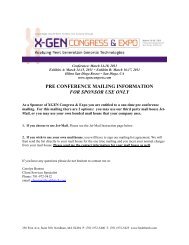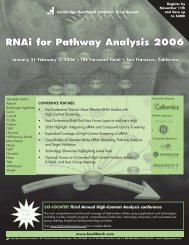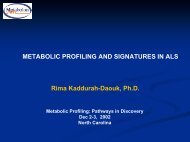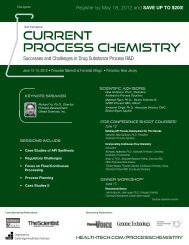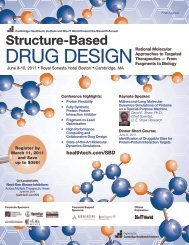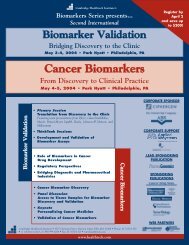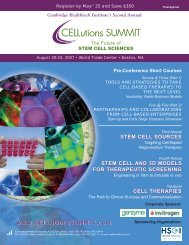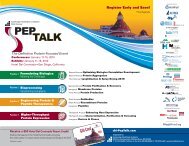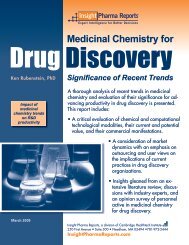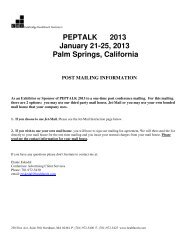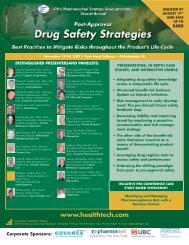2013 Applying Next Generation Sequencing Brochure.pdf
2013 Applying Next Generation Sequencing Brochure.pdf
2013 Applying Next Generation Sequencing Brochure.pdf
You also want an ePaper? Increase the reach of your titles
YUMPU automatically turns print PDFs into web optimized ePapers that Google loves.
Cover<br />
Conference-at-a-Glance<br />
Short Courses/Plenary Keynote<br />
<strong>Sequencing</strong> Strategies for Success<br />
Dynamics of the Microbiome<br />
on Health and Disease<br />
Single-Cell <strong>Sequencing</strong><br />
Short Courses*<br />
Monday, August 19, 9:00 AM-12:00 pm<br />
SC1: Mapping Genomes in 3D<br />
Genomes are organized into 3-dimensional (3D) conformation in vivo through interactions<br />
with protein factors. In addition, DNA elements separated by long genomic distances are<br />
known to functionally interact. However, the details of these 3D structures and their role in<br />
gene transcription are largely unknown. This course is designed to provide an overview of<br />
sequencing strategies and analysis for probing the 3D structure of genomes.<br />
Jennifer E. Phillips-Cremins, Ph.D., Research Scientist, Job Dekker Laboratory, Program in<br />
Systems Biology, University of Massachusetts Medical School<br />
Yijun Ruan, Ph.D., Professor and Director for Genome Sciences, Jackson Laboratory for<br />
Genomic Medicine, The Jackson Laboratory<br />
Chia-Lin Wei, Ph.D., Group Lead, <strong>Sequencing</strong> Technologies, DOE Joint Genome Institute<br />
John-David Herlihy, Ph.D., Product Manager, Covaris, Inc.<br />
Alexander Seitz, M.D., CEO, Lexogen<br />
Michael Vishnevetsky, Ph.D., Vice President, WaferGen Biosystems, Inc.<br />
Tuesday, August 20, 6:00-9:00 pm<br />
SC3: Assembly and Alignment<br />
The most important first step in understanding next-generation sequencing data is the initial<br />
alignment or assembly. This course is designed to provide an overview of alignment and<br />
assembly algorithms, and comparisons for various applications.<br />
Gabe Rudy, Vice President, Product Development, Golden Helix and Author, “A Hitchhiker’s<br />
Guide to <strong>Next</strong> <strong>Generation</strong> <strong>Sequencing</strong>”<br />
<strong>Sequencing</strong> Data Analysis<br />
and Interpretation<br />
Sponsor & Exhibit Opportunities<br />
Hotel & Travel Information<br />
SC2: Sample Prep<br />
The emergence of next-generation sequencing technologies has revolutionized genomic<br />
research. This dramatic advancement, however, still involves complicated and labor-intensive<br />
workflows for upstream sample preparation, library construction, and template amplification.<br />
Instructors share their solutions to prepare for sequencing runs (including the specific<br />
requirements of sequencing platforms) by addressing customizability, compatibility, and<br />
cost effectiveness.<br />
Stacey Broomall, Biologist, R&T, U.S. Army, Edgewood Chemical Biological Center<br />
*Separate Registration Required<br />
Registration Information<br />
Plenary Keynote Session<br />
Click Here to<br />
Register Online!<br />
Healthtech.com/<strong>Sequencing</strong><br />
Register by<br />
July 12<br />
and Save up<br />
to $250<br />
Jeffery A. Schloss, Ph.D.,<br />
Director, Division of<br />
Genome Sciences, National<br />
Human Genome Research<br />
Institute, National Institutes<br />
of Health<br />
Dr. Schloss, in addition to his role at NIH,<br />
manages a grants program to develop<br />
technologies with which to sequence human<br />
genomes for $1,000 and coordinates the Centers<br />
of Excellence in Genomic Science program.<br />
He helped formulate and then led or served on<br />
interdisciplinary initiatives, including the NIH<br />
Bioengineering Consortium (BECON), the Trans-<br />
NIH Nano Task Force and the U.S. interagency<br />
National Nanotechnology Initiative.<br />
David Galas, Ph.D.,<br />
Principal Scientist,<br />
Pacific Northwest<br />
Diabetes<br />
Research Institute<br />
Before joining Pacific Northwest<br />
Diabetes Research Institute, Dr. Galas was<br />
Professor and Senior Vice President at the<br />
Institute for Systems Biology, Chancellor and<br />
Norris Professor of Applied Life Science at<br />
the Keck Graduate Institute and Professor and<br />
Chairman of Molecular Biology at the University<br />
of Southern California. Involved in translating<br />
science into diagnostics and therapeutics in<br />
several biotechnology companies, he researches<br />
human genetics of complex diseases and the<br />
development and application of new technologies<br />
and computational methods. He has served on<br />
the NRC Board on Life Science, among other<br />
groups, and is a lifetime Associate of the<br />
National Academy of Sciences.<br />
Sherman Weissman,<br />
Ph.D., Sterling Professor<br />
of Genetics and Medicine,<br />
Yale University School<br />
of Medicine<br />
Dr. Weissman has long<br />
contributed to studies of the molecular biology<br />
of higher cells, focusing on the globin and MHC<br />
loci. Early accomplishments include identification<br />
of sequences for transcription termination<br />
and initiation for E. coli RNA polymerase and<br />
the sequencing of the SV40 virus. His lab has<br />
worked extensively on cDNA technology and<br />
has been developing methods for genome-scale<br />
analysis of individual and small numbers of cells.<br />
Widely experienced in genomic technology, Dr.<br />
Weissman has co-directed the Yale Center for<br />
Genomics and Proteomics, worked to develop<br />
technical approaches that can be applied to<br />
large-scale analysis, and participated in the<br />
NIHGR ENCODE project since its inception.<br />
Yaniv Erlich, Ph.D.,<br />
Principal Investigator,<br />
Whitehead Fellow,<br />
Whitehead Institute for<br />
Biomedical Research<br />
Dr. Erlich earned his Ph.D.<br />
from the Watson School of Biological Sciences<br />
at Cold Spring Harbor Laboratory in 2010 and<br />
has received the Harold M. Weintraub Award,<br />
the IEEE/ACM-CS HPC Award, Goldberg-Lindsay<br />
Fellowship and Wolf Foundation Scholarship<br />
for Excellence in Exact Sciences. His research<br />
interests lie in computational human genetics<br />
and he was selected to be part of the 2010<br />
Tomorrow’s PIs team by Genome Technology.<br />
Cambridge Healthtech Institute<br />
250 First Avenue, Suite 300<br />
Needham, MA 02494<br />
www.healthtech.com<br />
3



